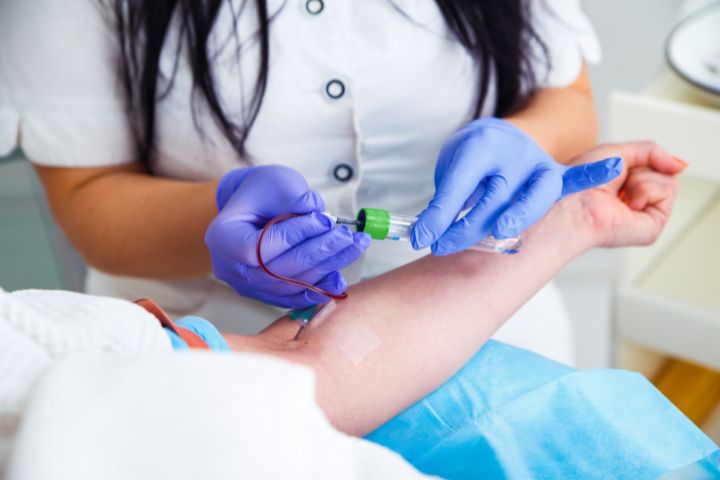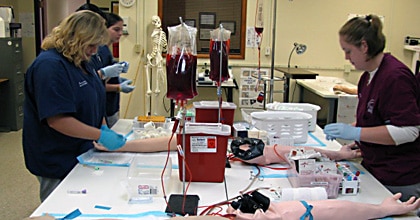The Path to Accreditation: Comprehending the Phlebotomy Training Course Journey and Its Value
As you consider the course to certification in phlebotomy, it's essential to understand the function you'll play in health care. Your training will certainly cover vital skills, from blood collection methods to patient communication. Each part of the program prepares you for the difficulties ahead. However exactly what does the journey involve, and why is qualification so vital for your future occupation? Let's explore these questions better.

The Duty of Phlebotomists in Healthcare
Phlebotomists play a necessary role in the healthcare system, working as the essential web link between clients and vital diagnostic testing. You'll carry out blood attracts, making sure samples are accumulated precisely and safely. Your proficiency assists in diagnosing medical conditions, checking health, and guiding treatment decisions.
In your daily communications, you'll require to develop trust with patients, making them really feel comfy during what could be a stressful experience. You're liable for identifying and taking care of examples carefully to avoid contamination or mistakes, which could influence test results.
Beyond this, you'll frequently work together with medical professionals and registered nurses, communicating crucial details regarding individuals' problems. Your duty is fundamental in keeping the operations in healthcare settings, ensuring timely and exact results. By mastering your abilities, you add meaningfully to person care, making you a crucial component of the medical group. Embracing this duty is key to your success as a phlebotomist.
Introduction of Phlebotomy Training Programs
When exploring phlebotomy training programs, you'll find different types made to fit various routines and discovering styles. Each program helps you develop essential skills like blood collection and patient interaction. Understanding these options is crucial to selecting the appropriate course for your job.
Kinds Of Educating Programs
A number of kinds of training programs are readily available for those looking to end up being skilled in phlebotomy. Furthermore, some health centers and facilities supply on-the-job training programs, offering functional experience while you discover. Whatever path you pick, each program aims to outfit you with the needed abilities for a successful phlebotomy career.

Secret Skills Developed
Grasping phlebotomy calls for a collection of essential skills that are established with comprehensive training programs. You'll find out technical skills like correct capillary choice, needle insertion, and blood collection methods. These hands-on practices ensure you can do procedures safely and efficiently. Furthermore, interaction abilities are essential; you'll need to interact with people, explain procedures, and placed them at convenience. Recognizing anatomy and physiology is essential, also, as it aids you locate blood vessels and recognize the body's feedback to blood attracts. Lastly, you'll gain knowledge of security methods and infection control, ensuring you maintain a sterilized environment. Each of these abilities is crucial for your success as a certified phlebotomist, making you a beneficial property in any type of health care setting.
Key Elements of a Phlebotomy Program
In a phlebotomy program, you'll concentrate on essential topics that prepared for your future job. You'll participate in hands-on training that allows you to apply what you've learned in real-world settings. Both the curriculum and useful experience are vital for your success as a phlebotomist.
Core Curriculum Introduction
While pursuing a phlebotomy training course, you'll come across a core educational program developed to outfit you with basic abilities and understanding. Phlebotomy Training Course. This educational program typically consists of anatomy and physiology, concentrating on the circulatory system and recognizing blood components. You'll also learn more about various sorts of blood collection techniques, including venipuncture and capillary slit techniques
Additionally, infection control and safety procedures are crucial parts, guaranteeing you understand just how to keep a clean and sterile environment. You'll study patient interaction, highlighting communication and compassion, which are critical for alleviating patient anxiety.
Hands-On Training Experience
Obtaining hands-on experience is an essential component of your phlebotomy training program. This functional training enables you to use what you have actually discovered in a real-world setting, enhancing your skills and confidence. You'll exercise venipuncture methods, learn just how to deal with different kinds of samplings, and obtain acquainted with the devices used in the area. Under the assistance of experienced trainers, you'll refine your skills, guaranteeing you're prepared for any kind of circumstance you might deal with.
Furthermore, you'll obtain the chance to connect with individuals, which is important for establishing your interaction skills. This mix of technological efficiency and interpersonal abilities is vital for your success as a qualified phlebotomist. Eventually, hands-on training is where concept meets method, solidifying your knowledge and readiness for qualification.
Certification and Licensing Needs
Prior to you can begin your career in phlebotomy, it is crucial to understand the certification and licensing requirements that vary by state. Most states call for phlebotomists to hold an accreditation from an acknowledged organization, such as the National Phlebotomy Organization or the American Society for Scientific Pathology. These certifications usually entail passing an examination that checks your knowledge and skills Full Article in the field.
In addition to accreditation, some states have particular licensing requirements. You might require to complete a specific number of hours in clinical practice, send proof of training, or undergo a background check. It is very important to investigate your state's laws to make certain you fulfill all necessary standards.
Remaining educated concerning these requirements not only aids you safeguard a placement but also boosts your integrity as an expert. By fulfilling these needs, you'll be well on your way to a successful career in phlebotomy.
Hands-On Training and Practical Experience
Hands-on training and sensible experience are crucial parts of your phlebotomy education and learning, as they permit you to use theoretical expertise in real-world situations. Throughout your training, you'll take part in monitored venipuncture, discover proper methods, and end up being knowledgeable about various blood collection tools. This straight involvement is important for building your confidence and developing your skills.
You'll function carefully with knowledgeable professionals who can guide you with the nuances of client interaction and example handling. Each technique session not just reinforces your understanding however additionally prepares you for the hectic environment of health care setups.
Furthermore, many programs incorporate professional rotations, enabling you to experience varied setups, from health centers to outpatient facilities. This exposure helps you adapt to different difficulties and person demands, ensuring you're well-prepared for your future role. Accept these chances, as they're vital their website to coming to be a competent and compassionate phlebotomist.
Challenges Dealt With During Training
While acquiring hands-on experience is vital, it's vital to identify the challenges that can develop throughout your phlebotomy training. You may run into anxiety when carrying out treatments on real clients, specifically if you're brand-new to the environment. The stress to get every little thing right can be overwhelming. Furthermore, understanding the skills required for blood attracts takes practice; you might deal with technique originally.
Time monitoring can additionally be a hurdle, as balancing concept, practical sessions, and individual commitments can feel daunting. You may encounter differing learning paces amongst your peers, causing feelings of self-doubt if you think you're falling behind. Adjusting to the different individualities of instructors can be tough, as each might have a special training design.
Acknowledging these barriers beforehand can prepare you for success and help you create strength throughout your training trip.
Career Opportunities After Certification

As you obtain experience, you could even take into consideration focusing on locations like pediatric or senior citizen phlebotomy, catering to details client demands. Some phlebotomists pick to advance their occupations by becoming laboratory technicians or pursuing more education in medical care fields.
Additionally, your accreditation can lead to functions from this source in training or monitoring brand-new phlebotomists, permitting you to share your expertise. With the healthcare industry continuously growing, your skills will constantly be in need, paving the way for a secure and satisfying profession. Welcome the opportunities awaiting you!
Frequently Asked Inquiries
What Is the Normal Period of a Phlebotomy Educating Training Course?
Phlebotomy training courses usually last around four to eight weeks. You'll involve in hands-on practice, classroom direction, and online understanding. Completing this training prepares you for certification and a rewarding job in medical care.
Are Online Phlebotomy Courses Available?
Yes, on-line phlebotomy programs are readily available. They offer versatility and convenience, enabling you to examine at your own rate. Just validate the program is certified to fulfill qualification needs and gain valuable skills for your occupation.
Just How Much Does Phlebotomy Training Usually Cost?
Phlebotomy training normally costs between $700 and $2,500, relying on the program and place. You ought to take into consideration variables like program size, consisted of materials, and hands-on experience when selecting the ideal training for you.
What Prevail Prerequisites for Phlebotomy Training?
Common prerequisites for phlebotomy training usually include a high school diploma or GED, immunizations, and a background check. Some programs might also need fundamental healthcare understanding or accreditations, ensuring you're planned for hands-on training.
Can I Work While Finishing My Phlebotomy Training?
Yes, you can function while completing your phlebotomy training. Many pupils equilibrium work with their research studies, yet make sure to manage your time efficiently to guarantee you meet both work and training commitments effectively.